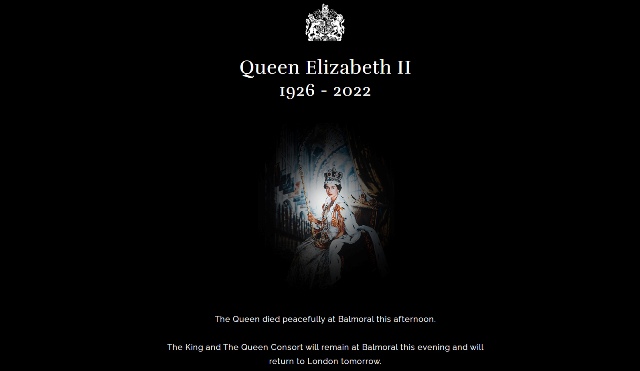 The Royal Family website announces the death of Queen Elizabeth II
The Royal Family website announces the death of Queen Elizabeth II
The Round Table is saddened by the death of Queen Elizabeth II. On her twenty-first birthday, in 1947, she famously dedicated her life to the service of the Commonwealth, and in any list of her achievements, her role in smoothing the transition from empire to post-colonial Commonwealth must stand among the highest. In 1952 she succeeded her father, King George VI, as Head of the Commonwealth, by the swift intervention of Jawaharlal Nehru, prime minister of the only member of the Commonwealth which was then a republic; the role had only been created three years before (in 1949) and lacked any form or substance, but over the next seventy years Queen Elizabeth left her distinctive mark on it. Although her role necessitated discretion and is shrouded in secrecy, it is well known that on several occasions (such as on the question of sanctions against the apartheid regime in South Africa) she fought the Commonwealth’s corner with her then UK prime ministers. She was widely admired, respected and loved not just in the UK and the other fourteen Commonwealth realms, but throughout the Commonwealth of fifty-six independent states.
Queen Elizabeth II died at Balmoral in Scotland on 8th September, 2022.
A Royal Family statement said: “The Queen died peacefully at Balmoral this afternoon. The King and The Queen Consort will remain at Balmoral this evening and will return to London tomorrow”.
The Round Table will be featuring reflections on the life of the Queen as the Head of the Commonwealth and comments and perspectives from across the Commonwealth.
From the Round Table website and journal archives, here are some of the articles reflecting her role over 70 years, including a letter from the Queen herself to the Round Table:
“Devoted to your service” – 70 years of the Queen as Head of the Commonwealth (2022)
The British Monarchy and the Modern Commonwealth (2022)
Long-lived Queen (2015)
Britain after the Jubilympics (2013)
The queen of Canada – Church and state in North America (2008)
The monarchy in the Commonwealth From king‐emperor to head of the Commonwealth (1970) Dermot Morrah
The making of a king: Prince Charles emerges into manhood (1970) Dermot Morrah
Letter from The Queen to the Round Table Journal (Jubilee issue 1960)
Live updates:
Reuters – Elizabeth’s eldest son Charles, 73, automatically becomes king of the United Kingdom and the head of state of 14 other realms including Australia, Canada and New Zealand.
Briefing paper on what happens following the death of a monarch – House of Commons
Tributes (will be updated):
UK Prime Minister’s Office – No 10
Indian Prime Minister Narendra Modi
Queen Elizabeth II: A legacy like no other – Australian Broadcasting Corporation
‘She was one of my favourite people’ – Canadian Prime Minister Justin Trudeau
Commonwealth Secretary General, the Rt Hon Patricia Scotland
Queen was the Commonwealth’s ‘psychotherapist’ – The Queen was the head of the global voluntary association and inspired loyalty among its nations – London Evening Standard
Australian Prime Minister Anthony Albanese suspends parliament and pays tribute
New Zealand Prime Minister Jacinda Adern tribute



